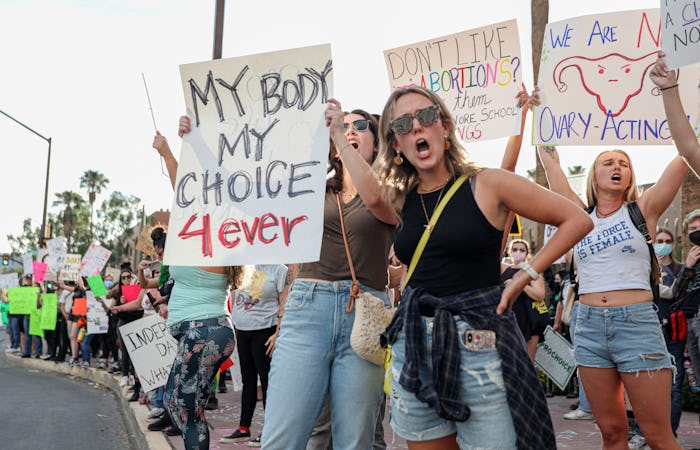Politics

Arizona Women Now Live Under Civil War Era Abortion Laws
“Today’s deplorable decision sends Arizona back nearly 150 years.”
On Tuesday, Arizona took steps to become the 15th state to all but completely ban abortion. In a 2-4 ruling, the state’s Supreme Court ruled to uphold an 1864 law that criminalizes all abortions at any developmental stage for any reason other than to preserve the life of the mother, superseding 2022 legislation permitting the procedure up to 15 weeks gestation. Doctors who perform abortions could face two to five year mandatory prison sentences.
The law, which predates Arizona’s statehood (Arizona became the 48th state in 1912), is part of what’s known as the Howell Code, Arizona’s first set of criminal laws. In 1928, the criminalization of abortion was officially codified into state law. While the provision that banned abortion was unenforceable while Roe v. Wade protected the right to abortion at a federal level, once the decision was reversed by the U.S. Supreme Court in June 2022, the 1864 statute was still technically on the books. Former Arizona Attorney General, Republican Mark Brnovich, moved to reassert the statute pertaining to abortion, despite legal pushback from Arizona’s chapter of Planned Parenthood, which argued that the passing of the aforementioned 2022 legislation state effectively repealed the 1864 statute.
The majority opinion, penned by Justice John R. Lopez IV, seemed to demure the issue to the legislature. “A policy matter of this gravity must ultimately be resolved by our citizens through the legislature or the initiative process,” he wrote. “Today, we decline to make this weighty policy decision because such judgments are reserved for our citizens. ... We defer, as we are constitutionally obligated to do, to the legislature’s judgment, which is accountable to, and thus reflects, the mutable will of our citizens.”
In other words: “the law says what it says; the legislature changes the laws, not the judiciary.”
“Today’s deplorable decision sends Arizona back nearly 150 years,” said Angela Florez, President and CEO of Planned Parenthood Arizona in a statement. “We know that today’s ruling does not reflect the will of the people, as Arizonans are overwhelmingly in favor of abortion access. ... Let me be clear, this is not the end of our fight. This law has no place in Arizona.”
The ruling will not go into effect for at least another two weeks, and in that time Planned Parenthood has reaffirmed its commitment to providing reproductive care, including abortions, through 15 weeks for as long as is legally possible. Attorney General Kris Mayes, a Democrat, has announced that she had no intention of prosecuting anyone, doctors or patients, under this statute, which is indeed significant. Last year, Democratic Gov. Katie Hobbs empowered the state attorney general alone to enforce abortion laws.
“No woman or doctor will be prosecuted under this law as long as I am attorney general,” Mayes said at a press conference. “Not by me, nor by any county attorney serving in our state, not on my watch.”
And yet this safeguard is not a guarantee that those seeking to obtain or perform an abortion would be protected: state prosecutors may indeed challenge this executive order. Moreover, Mayes will not be the attorney general forever, so the statute is still a significant barrier to reproductive rights in the state.